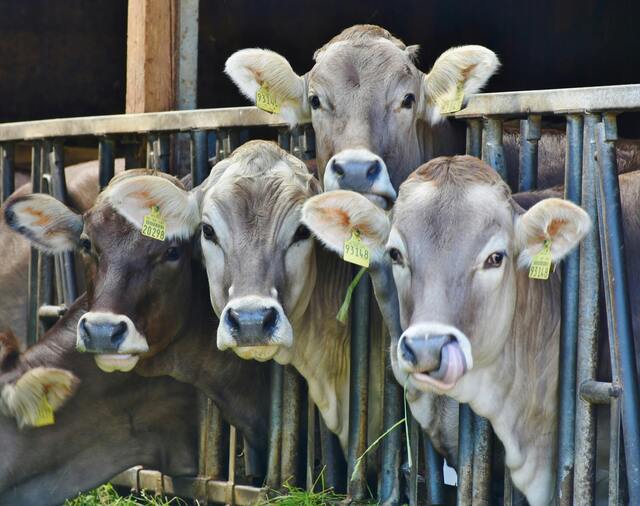Strong growth in livestock
Meat and Livestock Australia (MLA) has released the results of its 2024–25 National Saleyard Survey, revealing a significant increase in livestock transactions across Australian saleyards, with notable growth in both cattle and sheep consignments.
The annual survey, conducted by MLA’s National Livestock Reporting Service (NLRS), provides a comprehensive snapshot of saleyard activity for the financial year ending 30 June 2025. It captures data from 73 cattle and 35 sheep facilities across Australia.
Key national figures:
– Cattle transactions rose to 4.84 million head, up from 4.18 million in 2023-24.
– Sheep transactions increased to 16.39 million head, up from 14.09 million in 2023-24.
Agricultural exports surge $5 billion
Bendigo Bank’s Australian Agricultural Exports Report FY24/25 finds that the value of Australian agricultural exports surged $5 billion to $77.2 billion with growth driven by a boom in the value of red meat exports to all-time highs. The strong result for the agricultural sector comes amidst the backdrop of a rapidly shifting global environment driven by ongoing efforts by the US to reshape trade.
Queensland recorded its fourth consecutive year of record export value. Queensland saw growth of $2.2 billion (+16.8 per cent) to maintain its position as the second largest exporter for a consecutive season with export value of $15.5 billion in FY24/25. Growth in exports from Queensland were unsurprisingly boosted by the cattle industry which saw a 20.7 per cent rise and accounted for 59 per cent of the state’s export value. Resurgent cropping exports were also seen across Queensland with the value of crop exports jumping 85.4 per cent following a challenging season in FY23/24.
Climate risk for Farmers
The release of the long awaited National Climate Risk Assessment has laid bare the risks facing WA agriculture and our rural, regional and remote communities as climate change worsens.
The report assesses risks across society and environment, including communities, economy, agriculture, health, infrastructure and ecosystems and finds that Australia is likely to experience more intense and extreme climate hazards, along with future extreme weather that differs significantly from the past.
From paddock to plate
The House of Representatives Joint Standing Committee on Trade and Investment Growth has commenced a new inquiry into creating sustainable economic growth in rural and regional Australia.
The Committee seeks to identify opportunities to promote and support sustainable markets for rural and regional small and medium businesses in all sectors, through enhanced branding, and certification of Australian grown or produced goods and services.
Listen to farmers
Farmers have again made clear that climate change is their number one concern in the Australian Agricultural Insights study, carried out by Farmers for Climate Action (FCA) with the support of NAB.
A survey of 618 farmers found 57 per cent see climate change as the biggest threat to Australian agriculture.
Empowering red meat storytellers
Red meat industry participants with passion and flair for social media are being encouraged to apply for Meat & Livestock Australia’s (MLA) Social Media Academy.
Following the success of the inaugural workshop held at TikTok’s Sydney headquarters in April 2025, the FY26 Academy will return on 26–27 November 2025, offering hands-on training in TikTok video creation, content strategy, and community engagement.
New season carries uncertainty
As spring begins to bloom across Australia, it brings with it a sense of renewal, but for many rural communities, this season also carries deep uncertainty. Farmers in drought-affected regions are still waiting for meaningful rain. Others are facing the growing threat of locusts or dealing with the ripple effects of the Varroa mite. In areas hit hard by earlier floods, recovery is ongoing and resources are stretched.
Record beef production forecast
Australia’s beef industry is on track to break production records in 2025, according to Meat & Livestock Australia’s (MLA) latest Australian Cattle Industry Projections – September Update.
Despite a slight easing in herd numbers, the national cattle herd is forecast to remain stable at 31 million head, supported by strong seasonal conditions in the north and strategic herd management in the south.
2026 Rabobank Australian graduate program
Applications for Rabobank’s 2026 graduate program are now open, providing university graduates interested in agriculture and agribusiness the chance to start their careers with the specialist agribusiness bank.
Rabobank is offering places for graduates from around Australia to join the bank early next year, beginning with a formal 18-month graduate program, which kicks off in February 2026.
Online farm financial skills workshops
Primary producers across Australia have the opportunity to expand their knowledge, free of charge, at Rabo Client Council online workshops designed to help provide the financial skills essential to managing an agricultural enterprise.
The practical Financial Skills Workshops will be held online in August and September.
The initiative – which provides farmers with an opportunity to upskill – has been led and funded by food and agribusiness banking specialist Rabobank’s Rabo Client Councils, a group of innovative, forward-thinking farming clients who are passionate about making a difference in their communities and support a range of activities designed to make a meaningful impact on the vibrancy and resilience of rural Australia.
Sheep producers show resilience amidst challenges
The latest Sheep Producers Intentions Survey (SPIS), conducted by Meat & Livestock Australia (MLA) and Australian Wool Innovation (AWI), reveals a significant shift in producer sentiment and flock management strategies across the nation.
This shift is being driven by volatile market conditions, extreme weather events, and regulatory changes, most notably the planned phase-out of live sheep exports.
The survey, which gathered responses from 2,374 producers across Australia in May 2025, shows a net sentiment score of +52 for the sheep meat industry, up 48 points from the same time last year.
Australian beef producers signal confidence and stability
The latest Beef Producer Intentions Survey (BPIS) released by Meat & Livestock Australia (MLA) has shown that producers are confident in the sector’s outlook. It has also signalled producers are maintaining stable herd management strategies despite regional, national and global challenges.
The April edition of the 2025 survey, of 3,116 grass-fed beef producers across Australia provides a comprehensive snapshot of herd demographics, producer sentiment, breeding and sales intentions, and market dynamics.
Producer sentiment nationally has strengthened with a net sentiment score of +53, up from +47 in November 2024.








